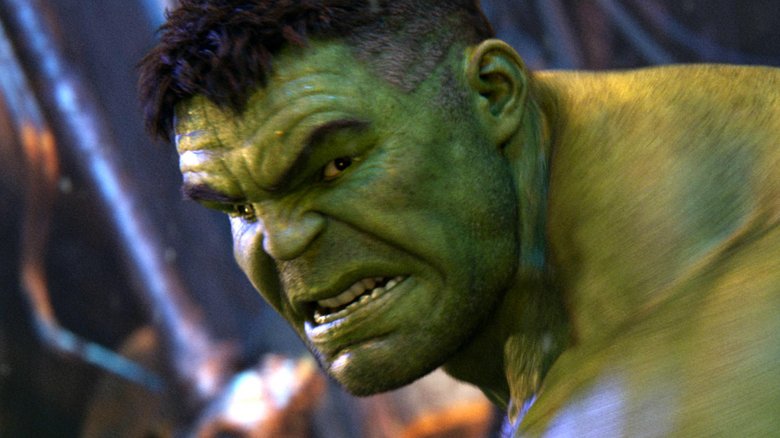Avengers: Infinity War Commentary Finally Sheds Light On Hulk's Behavior
Declared the most ambitious crossover event in history, Avengers: Infinity War featured a miles-long cast roster that brought together all corners of the sprawling Marvel Cinematic Universe. Scarlett Johansson's Black Widow, Chadwick Boseman's Black Panther, Robert Downey Jr.'s Iron Man, all four famous Chrises — the whole crime-fighting crew was there! Well, except for Paul Rudd's Ant-Man, Jeremy Renner's Hawkeye, and, for the most of the movie, Mark Ruffalo's Hulk.
In the first few minutes of Infinity War, Thanos (Josh Brolin) defeats the Hulk during a fight on the refugee ship that fled from Asgard at the end of Thor: Ragnarok. The not-so-jolly green giant didn't appear in the film again thereafter — and we finally know why.
According to the commentary track from the digital release of Avengers: Infinity War, the Hulk was M.I.A. in Infinity War not because he was ashamed that Thanos pummeled him to the ground and was scared to go meaty fist to meaty fist with him again, but because the Hulk is getting sick of coming to Banner's aid every time he and the Avengers need assistance in the form of brute force.
Joe Russo explained (via Polygon), "People speculated whether there was some fear on the Hulk's part about having to face Thanos again. But I think ultimately it's that he's tired of playing hero to Bruce Banner."
It's easy to see why viewers would rally behind the idea that the Hulk was in some way emotionally bruised after his scuffle with Thanos and after Heimdall (Idris Elba) used Bifröst to send him to Earth before being murdered by the Mad Titan. The Hulk staying in hiding because he was feeling — try not to gasp here – fear? That's not exactly a common occurrence when it comes to our temperamental green-skinned buddy — his whole schtick is being angry, after all — so it's only natural to latch onto something so rare. The Hulk experiencing an emotion he's rarely felt before and not fully understanding how to process it, thus causing him to stay locked away out of his own volition? It's a solid theory that makes for a satisfying character arc.
But the real reason for the Hulk's absence is way more fulfilling, as it both gives Banner's alter-ego the autonomy to become more than just the muscular manifestation of Banner's dark inner disquiet and pushes Banner to stop relying on the Hulk to save him from sticky situations. While many Marvel fans have believed Banner to be constantly trying to hold the Hulk in, it looks like the tables are beginning to turn as the Hulk has finally put his huge green foot down.
As Russo detailed, "There's a host body that is being fought over by two distinct personalities who hate each other. Both want control of the host body. We thought an interesting direction to take him in is, well, what if Banner, who typically uses the Hulk to solve crisis situations, what if the Hulk were no longer interested in solving those problems for Banner? So, the relationship is becoming increasingly dysfunctional and that's what's going on here."
Russo's explanation here shoots down many of the theories as to why Banner couldn't turn into the Hulk in Infinity War — including the suggestion that he was too angry to transform or that he blamed himself for what happened on the Asgardian ship — but it also stamps out one of the more thought-provoking ideas surrounding the character. (Also worth mentioning: we raised this exact possibility in our own list of Hulk Infinity War theories.)
Earlier this year, journalist Josh L. Dickey posited the idea, which ScreenRant's Thomas Bacon later documented in great detail, that the Hulk was missing from Infinity War because Loki (Tom Hiddleston) was actually masquerading as Banner. (That would certainly explain why there weren't any "Hulk out" moments, right?) Though Russo's mention of "a host body that is being fought over by two distinct personalities who hate each other" could apply to Loki and Hulk if he truly was posing as Banner, given that Russo goes on to focus specifically on Banner and the Hulk's tense relationship, the theory — as enthralling as it may be — sadly falls apart.
After the jaw-dropping ending of Avengers: Infinity War, we've been operating under the impression that Avengers 4 will rip out more hearts, send us down more winding paths, and feature more intensity than previously thought possible. Now, it looks like Bruce Banner and the Hulk's turbulent dynamic will be a major part of that chaos. Ah, boys — can't live with 'em, can't live without 'em, right?
